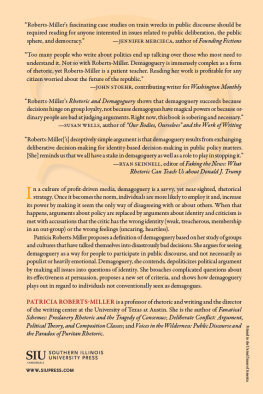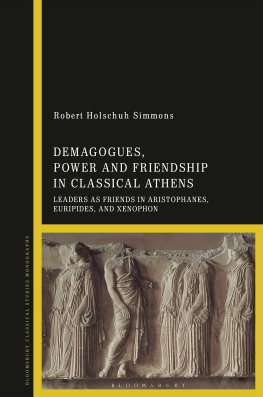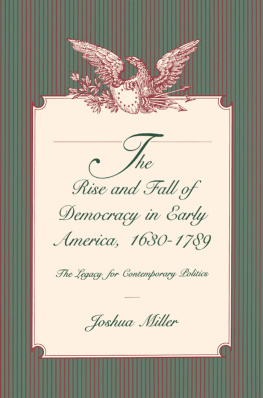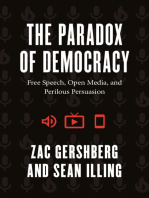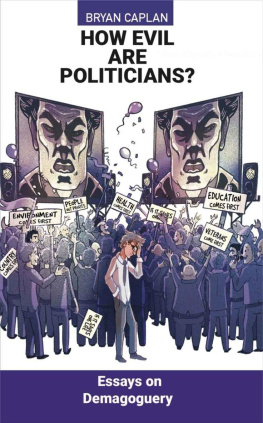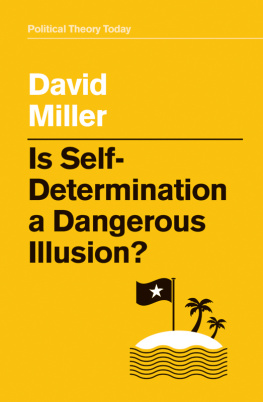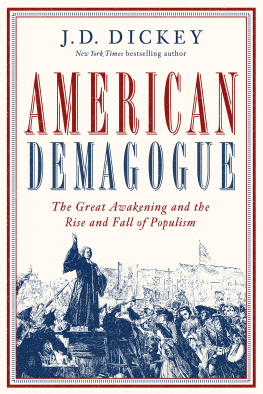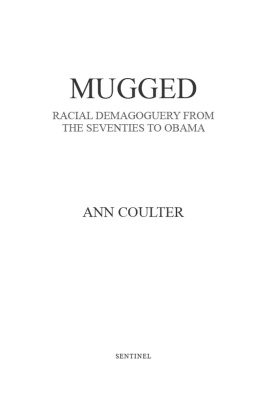I.
Democratic Deliberation
T here is a tendency to talk as though identity politics is a new phenomenon, but there have always been people who want to reduce politics to identity. People all over the political spectrum will often insist that its possible to accept or reject an argument purely on the basis of the person who makes it, which often means whether an advocate (or critic) is liberal or conservative.
This reduction of complicated policy questions to whether liberals or conservatives are better has four troubling consequences.
- One can look as though one is standing apart from the argument and taking an objective stance simply by saying both parties are just as bad. Thats reducing the complicated notion of objective to some vague sense of not obviously partisan. It might be a very biased statement (e.g., the common comment that abolitionists and slaveholders were just as bad); it might not. Saying both parties are just as bad isnt objective; its just a thing you say to make people think youre objective. It can be nothing more than an excuse not to get involved.
- Partisans will try to appeal to the notion that political arguments are really about which group is better in order to dismiss criticism of their group. We might think that we can refute criticism by pointing out that the other party does the same thing too. But whether the other party does it too is relevant only if were arguing about which party is better, not which policies are better.
- The underlying problem is that we arent arguing policies; were arguing about identities, and therefore compromise is never considered a principled realization that they might have some legitimate concerns. It is, at best, a Machiavellian strategy forced on us by the bad group.
- Losing a political argument now has much higher stakes. It isnt just about whether you persuaded someone of the merits of your policy, but about whether you are a good person.
Democracy is a very old political model, 2,500 years old, in fact. So there is a lot of data about democracieswhat theyre good at, what theyre bad at, when they succeed, why they fail. There are two different kinds of characteristics that scholars of democracies note: structural and rhetorical. Structurally, democracies succeed when there is a strong middle class, the police and the military are separate and under civilian control, due process is perceived as a fairness test that applies across groups, government has to respect some kind of private space into which it will not intrude unless the public good is at stake, and people get mad if political figureswhether their own chosen representatives or those peoples representativesappear to be untruthful or unfair. If people decide to see things as a zero-sum gamethe more they succeed, the more we lose, and we should rage about any call made against us, and cheer any call made against themthen democracy loses.
Democracy depends on rhetoricon people arguing with one another and trying to persuade one another. But as we all know, not all ways of arguing are the same, and, therefore, there have long been arguments about what kinds of rhetoric are good and what kinds are harmful. And as with the structural characteristics above, there are some broad principles about good rhetorical practices on which people have agreed. Essentially, public discourse about policies (what actions we should take) should favor inclusion, fairness, responsibility, self-skepticism, and the stases (or stock issues).
The inclusion rule, like every one of these principles, is simultaneously straightforward and complicated. The discussion should include all the people with relevant information, the people with variant perspectives, and, as much as is possible, the people who will be most affected. As much as possible, we try not to rely on secondhand (or thirdhand) versions of what they think, and we try to be accurate about their points of view. Sometimes people have to be excluded from the conversationparticularly if they threaten violence (the fallacy called argumentum ad baculum), or if they are refusing to let people speak, or refusing to follow the rules of discourse. When exclusion happens (and it always has to happen to some extent, or wed never finish the argument), it cant simply be on an us-versus-them basis. We have to exclude them on grounds we would think reasonable were we the ones being excluded.
Thats an example of the fairness rule. Trying to be fair in an argumentenforcing rules, including the rule that the rules are applied to everyone equallywill lead to arguments about the rules. And thats a good sign. Participants often need to argue about how we should argue, what we will count as relevant evidence, what constitutes disruptive behavior or unfair moves, and what stases are the most relevant. In fact, arguments about how we should argue most interfere with demagoguery, especially if those arguments concern whether the rules are being applied to all participants equallyif argument by insult is allowed for us, then it is also permitted for them. We also strive, to the best of our ability, to be fair to one another in terms of how we characterize or represent what others think. Sometimes that means making inferencespointing out that our opposition is making an assumption we think is invalidbut we need to be responsible in how we make those inferences. We can be mean, angry, vehement, and highly critical, as long as we dont whine if they are just as mean, angry, vehement, and critical with us. And we need to take responsibility for what we say, in terms of things like redeeming our claims if theyre challenged, trying to be accurate and honest, trying to ground our arguments in relevant evidence and credible sources (more on that below), and acknowledging the logical premises and consequences of what were arguing. We need to enter the conversation willing to be wrong, willing to admit the limits of our own knowledge, willing to reconsider our evidence, sources, and premises. That is self-skepticism.
As will be discussed later (because its complicated), a lot of people assume an absolute binary between certainty and hippy-dippy relativism. They assume that you are either certain (in which case you are justified in acting on your beliefs) or you have no idea (in which case you arent). In fact, we all operate in a world that has various degrees of uncertainty, some of which should make us pause, but most of which enable us to act because we are reasonably sure. The self-skepticism rule doesnt mean we should never act because we cant be certain, but it does mean we should, especially if the stakes are high, think about how we are thinking.
If we are disagreeing about a course of action, then we are in the realm of policy deliberation, and there is a long-standing consensus about what stases are most helpful for trying to determine the best policies for a community. Productive policy deliberation involves arguing about the need (what the problem or ill is such that we need to change what were doing) and various possible plans to address it. We must also argue about the causes of the problem, because, despite what a lot of people believe, the right solution is rarely obvioussolutions are directly related to the specific cause(s), and so we have to make sure we have the cause accurately described. If my tires are worn because theyre old, then replacing them is a great plan; if theyre worn because my alignment is off, simply replacing my tires is in the long run a very expensive solution. Before I replace the tires (plan), I should figure out why theyre worn (cause). When we argue about need and its causes, we also identify an illthat is, a problem that is significant and inherent to the situation (it wont go away on its own). If I go to a doctor with a lot of symptoms and propose that she give me antibiotics, the doctor needs to determine the cause of my symptoms; if the cause is a virus that will go away in a day, then my paying for antibiotics is unnecessary, and may even have unintended consequences, such as making me more resistant to antibiotics I might need later.


